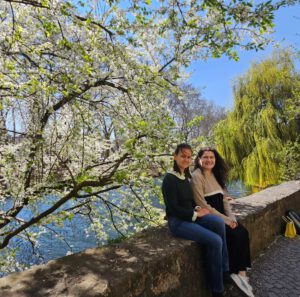Annotating Literature was initiated in 2011 by Prof. Dr. Matthias Bauer and Prof. Dr. Angelika Zirker. They had noticed that many explanatory annotations are not helpful for understanding literary texts and started research into the matter. As a part of this research, they set up a student project for the annotation of literary texts in the classroom and in student groups who work independently.
Marina Kirillova (mentor The Chimes Group) and Ilea Rahn (mentor Annotating Poetry Group)
Missing: Michael Reid (project assistant)
Aims:
The student groups are part of a larger research project that is concerned with developing a transparent system for annotating literary texts: the Tübingen Explanatory Annotations System (TEASys).
This system takes into account that readers have different needs and interests. With TEASys, they can choose the amount and depth of information they receive, as well as the kind of information they are provided with. For more information on this research project see.
Our student groups use this system to write academically reliable annotations that take into account readerly needs. For this, they orient themselves by the style guide – a set of practical recommendations that is based on the theory we have developed. This styleguide is continuously revised and improved.
The annotations written by our participant will be published on our TEASys viewer.
How you can participate:
We welcome students of all backgrounds – no matter your subject or experience. After the introduction session, the groups will meet for two block sessions followed by weekly meetings and a last block session at the end of the semester. The meetings are student-only – after your annotations have been peer-reviewed, they are handed in to Prof. Bauer and Prof. Zirker, who review them as well. When your annotations are finished, they are uploaded unto our homepage.
B.A. students can gain 4 ECTS for writing 6 annotations or 6 ECTS for writing 10+ annotations. You can use these ECTS for your Schlüsselqualifikationen.
M.A. students can gain 3 ECTS for their Master work groups. For this, you have to write 6 annotations.
Our groups:
(1) Poetry (participants can choose which poem they want to work on)
(2) Charles Dickens’s The Chimes
(3) Mark Twain’s The Prince and the Pauper
(4) Francis Beaumont and John Fletcher’s The Knight of the Burning Pestle
Contact: annotating-literature [at] es.uni-tuebingen.de

